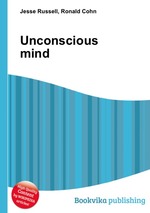Unconscious mind
Jesse Russell Ronald Cohn
бумажная книга
High Quality Content by WIKIPEDIA articles! The unconscious mind (or the unconscious) consists of the processes in the mind that occur automatically and are not available to introspection, and include thought processes, memory, affect, and motivation. The term was coined by the 18th century German romantic philosopher Friedrich Schelling and later introduced into English by the poet and essayist Samuel Taylor Coleridge. The concept was developed and popularized by the Austrian neurologist and psychoanalyst Sigmund Freud. Empirical evidence suggests that unconscious phenomena include repressed feelings, automatic skills, subliminal perceptions, thoughts, habits, and automatic reactions, and possibly also complexes, hidden phobias and desires. In psychoanalytic theory, unconscious processes are understood to be expressed in dreams in a symbolical form, as well as in slips of the tongue and jokes. Thus the unconscious mind can be seen as the source of dreams and automatic thoughts (those that appear without any apparent cause), the repository of forgotten memories (that may still be accessible to consciousness at some later time), and the locus of implicit knowledge (the things that we have learned so well that we do them without thinking).


